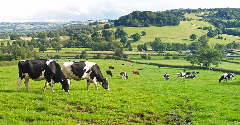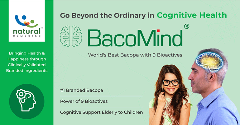News
Cochineal Sets an Example to us All
1 Sep 2014If we look at history, the aesthetic aspects of food were not a major consideration until relatively recently, and began to change fundamentally with the onset of the Industrial Revolution. (Today, for example, a Spanish paella rice dish would be unacceptable to any Spaniard without the saffron yellow coloring. My grandmother would send it back to the kitchen). From […]

If we look at history, the aesthetic aspects of food were not a major consideration until relatively recently, and began to change fundamentally with the onset of the Industrial Revolution. (Today, for example, a Spanish paella rice dish would be unacceptable to any Spaniard without the saffron yellow coloring. My grandmother would send it back to the kitchen).
From the early nineteenth century, a trend developed to add substances to food for cosmetic reasons, including an increasing list of additives – many of which resulted in significant health hazards. In recent decades, we have seen a movement to combat the adulteration of foods with colorants containing heavy metals, dangerous organic and inorganic elements and so on. The 20th century, with improved chemical analysis and deeper awareness, has led to the “positive listing”, indicating the substances that meet the criteria for human consumption.
Today’s concern, however, right after consumer protection, should be the environment, through the use of natural, non-toxic and biodegradable substances. In the world of edible insects, we find the Dactylopius coccus – better known as cochineal, source of one of the few water-soluble red colorants to resist degradation with time, and also one of the most light- and heat-stable and oxidation-resistant of all the natural organic colorants. It is even more stable than many synthetic food colors.
So here it is, “cochineal”, the source of carmine red. This little soldier from nature offers its magic with little to no direct ecological footprint compared to other reds, whose cultivation and processing can require prime land usage, fertilizers, pesticides and significant water. On the other hand, our champion’s natural habitat is desert to semi-desert land in underdeveloped areas, with cactus as its host. Cochineal’s carminic acid is the ideal candidate for the food industry to compensate, in an eco-friendly way, for color variations and loss due to light, air, extremes of temperature, moisture, and storage conditions in its capricious marketing war.
After taking into consideration dietary practices, religious beliefs and dealing with possible allergies the same way as any other allergen, cochineal, with today’s industrial challenge of feeding the world without destroying the planet, could contribute to the increasing food colorant additive demand in a responsible way.
The key drawback, which is psychological, would be cochineal’s major challenge – the insect- sourced “yuck factor“, mostly driven by a lack of knowledge, custom and information by the general public.
In the FDA’s Defect Levels Handbook, insect parts are considered as one of the natural or unavoidable defects in food production that present no health hazards for humans – yet nobody seems to stop consuming chocolate, peanut butter, marmalade, tomato sauce – or wine, for that matter – where insect parts are frequently present.
Every trend has its consequences for the global environment. The current pace of food consumption calls for better understanding of the issues rather than a simple impulse of disgust for alternative solutions. Above all, we must make sure that the other options on the table avoid becoming part of the problem, by taking into consideration arable land, water depletion, carbon food print and other key factors.
Related news

Has ‘clean’ had its day?
22 Dec 2025
Wielding clean-label positioning and fortification as marketing levers is a dangerous strategy, and brands would be better off explaining the hows and whys of the ingredients in their products, say experts.
Read more
Celebrating the winners of the Fi Europe Innovation Awards 2025
3 Dec 2025
Food industry stakeholders celebrated as the winners of the Fi Europe Innovation Awards were announced at a ceremony in Paris.
Read more
Alternative protein startups pivot to B2B ingredients amid funding shift
27 Nov 2025
Alt protein startups are pivoting from consumer meat analogues to high-value B2B ingredients, driven by stronger investor interest, better margins, and clearer commercial pathways.
Read more
Walmart Marketplace’s record growth prompts search for UK sellers
26 Sep 2025
Walmart’s third-party e-commerce platform, Marketplace, has witnessed extraordinary growth – but a need for more product diversity has prompted the retailer to recruit UK sellers.
Read more
The winners of Vitafoods Europe Startup Challenge 2025 revealed
29 May 2025
Four startups – Yomio Drops, PFx Biotech, Revobiom, and Favamole – took top prizes at this year’s Vitafoods Europe Startup Challenge awards.
Read more
East takes on West in the fight for future food flavours
30 Apr 2025
Asian and South American flavours are now key components on global menus, driven by a growing global appetite for culinary mashups.
Read more
Food companies urged to bring ‘joy’ and urgency to healthy food mission
14 Mar 2025
For too long, businesses have treated health and sustainability as separate agendas – but there is growing evidence to show diets that benefit human health can also enhance that of the planet, say experts.
Read more
Entries open for inaugural Vitafoods Europe Innovation Awards
29 Jan 2025
Entries are open for the inaugural Vitafoods Europe Innovation Awards, celebrating the ingredients, finished products, partnerships, and initiatives redefining the nutraceutical landscape.
Read more
Paris Olympics: Food and beverage brands champion health, fun, and sustainability
5 Aug 2024
Food and beverage brands are aligning with the Paris Olympics 2024 Food Vision, which emphasises sustainability, local sourcing, and plant-based diets.
Read more
Natural Remedies: Bringing health and happiness via validated branded ingredients
18 Apr 2024
Natural Remedies is an internationally renowned botanical healthcare company committed to advancing the field through rigorous research and the development of clinically validated Branded Ingredients. Guided by our foundational principle of ‘BEING USEF...
Read more